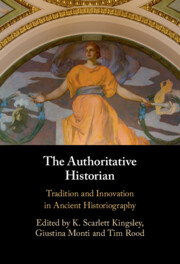Book contents
- The Authoritative Historian
- The Authoritative Historian
- Copyright page
- Dedication
- Contents
- Contributors
- Preface
- Abbreviations
- Introduction
- Part I Myth, Fiction, and the Historian’s Authority
- Part II Dislocating Authority in Herodotus’ Histories
- Chapter 5 Herodotus as Tour Guide
- Chapter 6 Interpretive Uncertainty in Herodotus’ Histories
- Chapter 7 ‘It is no accident that …’
- Chapter 8 Through Barbarian Eyes
- Part III Performing Collective and Personal Authority
- Part IV Generic Transformations
- Part V Innovation within Tradition
- Bibliography
- Index Locorum
- General Index
Chapter 5 - Herodotus as Tour Guide
The Autopsy Motif
from Part II - Dislocating Authority in Herodotus’ Histories
Published online by Cambridge University Press: 02 December 2022
- The Authoritative Historian
- The Authoritative Historian
- Copyright page
- Dedication
- Contents
- Contributors
- Preface
- Abbreviations
- Introduction
- Part I Myth, Fiction, and the Historian’s Authority
- Part II Dislocating Authority in Herodotus’ Histories
- Chapter 5 Herodotus as Tour Guide
- Chapter 6 Interpretive Uncertainty in Herodotus’ Histories
- Chapter 7 ‘It is no accident that …’
- Chapter 8 Through Barbarian Eyes
- Part III Performing Collective and Personal Authority
- Part IV Generic Transformations
- Part V Innovation within Tradition
- Bibliography
- Index Locorum
- General Index
Summary
I put forward a new suggestion here about what John Marincola in an important paper called ‘the narrator’s presence’ in Herodotus’ Histories.1 I reconsider, in particular, a number of claims of autopsy and suggest on that basis that it is sometimes illuminating to think of Herodotus as adopting the role of tour guide or, rather, virtual tour guide. My arguments involve a view about Herodotus’ ‘good faith’ or ‘trustworthiness’ that will not be agreeable to those who receive with (sometimes exasperated) indignation any suggestion that Herodotus knowingly said untrue things in the Histories. I hope, however, that what I have to say makes a coherent and convincing case, with a more persuasive explanation than has been offered by others,2 that false statements some scholars would condemn as mere lies make in their context in the Histories an effective and readily comprehensible contribution to Herodotus’ narrative aims, and that he would have seen them as harmless or, in our contemporary term, ‘victimless’ untruths.
- Type
- Chapter
- Information
- The Authoritative HistorianTradition and Innovation in Ancient Historiography, pp. 101 - 120Publisher: Cambridge University PressPrint publication year: 2023

